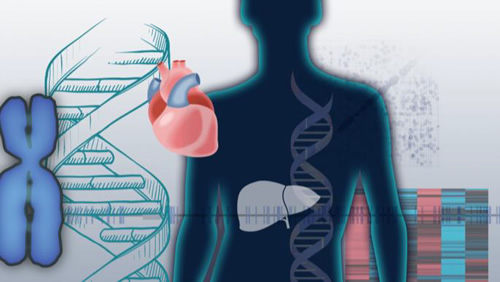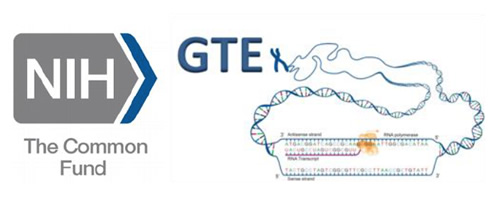Last updated: July 07, 2015
June 2 2015 Genotypetissue Expression Gtex Project Reports Research Result
Genotype-Tissue Expression (GTEx) Project Reports Research Result
June 2, 2015
Some day in the not-too-distant future, many people will have their genomes sequenced as part of their routine medical care. It is the hope of many that such genomic information will lead to improved approaches for preventative medicine and personalized treatments. To realize such a future, a detailed knowledge of the role that individual DNA variants play in genome function is needed. An exciting research endeavor that aims to generate that knowledge is the Genotype-Tissue Expression (GTEx) Project.
Funded since 2010, GTEx is an NIH Common Fund project that aims to provide an information resource about the interplay between genomic variation (i.e., DNA differences among people) and gene activity (i.e., gene expression). Specifically, GTEx researchers study the relationship between particular genomic variants and the expression of genes in different human tissues. Examining how genomic variants influence gene activity will help researchers understand the role that these variants play in common diseases, such as cancer, heart disease, and diabetes.
 GTEx scientists are examining more than 30 tissue types collected from deceased donors and organ/tissue transplant patients, creating a robust gene-expression atlas for multiple human tissues. So far, GTEx has collected and analyzed biospecimens from over 800 donors, and is expected to reach its goal of 900 by the end of summer 2015. To help ensure that the consent process and other aspects of the project effectively address the concerns and expectations of the study's participants, GTEx includes an Ethical, Legal, and Social Implications (ELSI) research component.
GTEx scientists are examining more than 30 tissue types collected from deceased donors and organ/tissue transplant patients, creating a robust gene-expression atlas for multiple human tissues. So far, GTEx has collected and analyzed biospecimens from over 800 donors, and is expected to reach its goal of 900 by the end of summer 2015. To help ensure that the consent process and other aspects of the project effectively address the concerns and expectations of the study's participants, GTEx includes an Ethical, Legal, and Social Implications (ELSI) research component.
Last month, GTEx researchers published a major paper in Science, examining gene-expression data collected from 1,641 samples across 43 tissues from 175 individuals; these data were generated as part of the pilot phase of GTEx. They looked for links between variants at specific genomic locations and the level of activity of genes in particular tissues, finding both that many variants affected activity in all tissues and that some variants affect activity in only one tissue. Two companion papers were also published in Science. One examined the effects of protein-truncating variants on gene activity; the other looked for gene-activity patterns associated with age, gender, and other factors.
To date, no project has analyzed genomic variation and gene expression in as many tissues in such a large population. GTEx has established a database and a tissue bank that can be used by researchers around the world for future studies. The data generated link genomic variants associated with disease to gene activity, bringing us one step closer to understanding the biology underlying important human diseases.
 GTEx is a prototypic NIH Common Fund project, in that no one NIH institute or center would have likely pursued the project alone. The NIH Common Fund aims to support projects that are of interest to many NIH institutes and centers, as well as their grantees. The GTEx project is funded through the NIH Common Fund and managed by the NIH Office of the Director in partnership with NHGRI, the National Institute of Mental Health (NIMH), the National Heart, Lung, and Blood Institute (NHLBI), the National Cancer Institute (NCI), the National Center for Biotechnology Information (NCBI), the National Institute on Drug Abuse (NIDA), and the National Institute of Neurological Disorders and Stroke (NINDS).
GTEx is a prototypic NIH Common Fund project, in that no one NIH institute or center would have likely pursued the project alone. The NIH Common Fund aims to support projects that are of interest to many NIH institutes and centers, as well as their grantees. The GTEx project is funded through the NIH Common Fund and managed by the NIH Office of the Director in partnership with NHGRI, the National Institute of Mental Health (NIMH), the National Heart, Lung, and Blood Institute (NHLBI), the National Cancer Institute (NCI), the National Center for Biotechnology Information (NCBI), the National Institute on Drug Abuse (NIDA), and the National Institute of Neurological Disorders and Stroke (NINDS).
For more information about the recent GTEx publications, see nih.gov/news/health/may2015/nhgri-07.htm. To access GTEx data, see gtexportal.org/home/. Lastly, GTEx recently held a symposium at the NIH in Bethesda, Maryland to showcase its accomplishments. To view a recording of the two-day symposium, "GTEx Symposium: All Things Considered - Biospecimens, 'Omics Data, and Ethical Issues", see videocast.nih.gov/summary.asp?Live=16342&bhcp=1 and videocast.nih.gov/summary.asp?Live=16346&bhcp=1.
Posted: July 7, 2015
